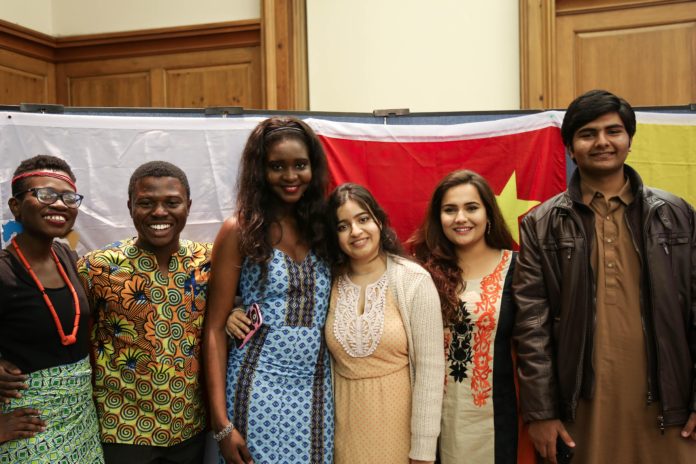
One wouldn’t expect to find platters of Banh Mi sandwiches, bowls of Indian curry, and Japanese nigiri in Greencastle, Ind.
A mix of cultures in the heart of the midwest, DePauw University’s annual International Bazaar took place Saturday night with the goal of representation and inclusion.
Through the International Bazaar, the International Students Association (ISA) hoped to remedy the underrepresentation that some cultures feel on this campus. ISA, the largest student organization on campus, is open to everyone, including domestic students, who are interested in learning about global cultures.
Senior Yuka Kitajima said ISA’s mission is “to create a family-type of atmosphere and a good community in general.”
International students make up about nine percent of the student body, and the class of 2020 has about 13 percent international students. “The presence of international students is not very strong on campus,” Kitajima said, “but ISA provides a platform to showcase different cultures and push people out of their comfort zones while still providing comfort within the community.”
For the bazaar, the executive board expected about 300-400 people to come based on previous years’ turnouts. After planning for over a month, sophomore Pyi Theim Kyaw said, “it was really successful and a great accomplishment.”
The bazaar was based around food and performances from a variety of cultures. The dishes were all handmade by local chefs and international students, and after a $5 entrance fee, guests were free to taste any type of authentic foods. Performances began about an hour into the event, and included Chinese songs, a traditional Brazilian dance, and a Burmese song sung by Pyi Theim Kyaw, just to name a few. The event closed with a fashion show that highlighted clothes from different nations.
First-year Manpreet Kaur, a dancer in the bazaar, performed with several international students. “The best part was that so many DePauw students and faculty members came to the event,” said Kaur, “and through it we were able to learn more about the different cultures that coexist at our university.”
First-year Joevita Weah also applauded the turnout at the bazaar. “It was really nice to see so many students and teachers there,” said Weah. “The food was wonderful and there was a wide variety of music, cuisines, and clothes.”
While the International Bazaar focused on diversity on campus, it was open to domestic students to attend and participate in. “Being inclusive is very important,” said Pyi Theim Kyaw. “Being diverse and being inclusive are very different, because to be inclusive means to take action and includes education and spreading awareness to showcase how amazing international students are.”
ISA has been using the hashtag #embracediversity, which Kitajima finds very important. “A lot of times, whenever culturally affiliated student organizations hold events, the guests are usually within only that community,” Kitajima said. “People should step out of their own bubble and see the other cool things and amazing talents present on campus.”
Pyi Theim Kyaw said that the event was successful in uniting students of all backgrounds. “Through the bazaar, I was just sitting by the side and looking at everyone having fun and laughing at the same time,” Pyi Theim Kyaw said. “That’s when I realized that if you can laugh together, you can collaborate together. You can work together no matter your race, your ethnicity, your gender; however you’re different from another person, you can work together.”
Kitajima is optimistic that the bazaar will continue to spark students’ interest in ISA and different cultures. “I hope, eventually, for DePauw to be a place for every student to feel valued, important, and loved on campus,” said Kitajima, “and to be a place for international students, or LGBTQA+, or African American students, Latino students, first generation students, whatever their identities are. I hope DePauw to be a place for that.”
